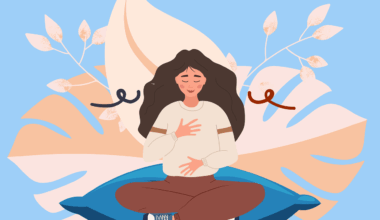The Psychological Benefits of Relaxation Techniques for Senior Athletes
As senior athletes continue their active lifestyles, incorporating relaxation techniques into their routine can significantly support their mental well-being. Regular physical activity is a pillar of healthy aging, but the psychological aspects of fitness are often overlooked. To maintain a balanced lifestyle, seniors can benefit from practices that enhance relaxation and reduce stress levels. Techniques such as deep breathing, visualization, and gentle yoga have been shown to improve focus, promote a calm mind, and foster emotional resilience. Furthermore, these practices help alleviate anxiety, creating a more enjoyable exercise experience. Engaging in routine relaxation boosts confidence and tackles feelings of inadequacy in an increasingly active landscape. Asking for support in learning these techniques can be a helpful first step. Additionally, participating in group sessions can also enhance social connections while providing a safe space to learn. These connections have a positive impact on emotional health, providing a sense of community and belonging. Such social interactions contribute to the overall mental wellness of senior athletes. By prioritizing relaxation techniques, seniors can further enjoy their fitness journey and the psychological benefits that come from remaining active.
The Importance of Stress Management
Stress management through relaxation techniques can significantly enhance the quality of life for seniors involved in athletics. Over time, chronic stress can hinder not only physical health but also mental well-being. For senior athletes, this could mean reduced performance and increased fatigue. Taking the time to engage in relaxation activities such as tai chi, meditation, or progressive muscle relaxation can counteract these negative effects. By learning to relax, seniors equip themselves with coping strategies that are beneficial during their athletic pursuits. Additionally, incorporating these techniques may lead to improved recovery times and overall endurance. It is essential for seniors to recognize the signs of stress, such as irritability, difficulty concentrating, or sleep disturbances. Implementing relaxation practices into daily routines can alleviate these symptoms and enhance cognitive function. To create a personalized relaxation plan, seniors may collaborate with their health coaches or fitness trainers. They can also utilize resources like online videos or classes focused on relaxation techniques. Many community centers offer workshops specifically catered to senior fitness, creating an opportunity for learning in a supportive environment. This proactive approach supports the psychological resilience necessary for sustained involvement in athletic activities.
One significant advantage of relaxation techniques is their ability to improve sleep quality for senior athletes. As we age, sleep patterns tend to change, leading to challenges in attaining restorative sleep. Quality sleep is crucial for recovery, memory, and emotional stability. Integrating relaxation into a bedtime routine can help mitigate insomnia and promote deeper, more restful sleep. Exercises like gentle stretching or mindfulness meditation create a comforting pre-sleep ritual that signals the body to wind down. Establishing consistency with these relaxation strategies contributes to more structured sleep patterns, easing transitions into restful states. Additionally, seniors might benefit from guided relaxation recordings specifically designed to aid in sleep. Such resources can be found on platforms like YouTube or meditation apps. By dedicating time nightly for these practices, senior athletes not only enhance sleep quality but also improve their overall mood and cognitive performance during the day. Over time, a well-rested mind translates to improved focus and reduced stress during their athletic endeavors. With better sleep, seniors can feel more energized and motivated, translating to ongoing progress in their fitness goals.
Social interaction is another key component that contributes to the psychological benefits of relaxation techniques for senior athletes. Engaging in group relaxation sessions fosters a sense of belonging and mutual support among participants. This collaborative experience can be instrumental in motivating seniors to continue pursuing their athletic goals. Those who practice relaxation techniques with friends or peers often experience shared enthusiasm, making the process enjoyable. As they grow closer, seniors cultivate a support network that encourages open conversations about fitness struggles and victories. Building these relationships plays a crucial role in combatting feelings of loneliness, which can be prevalent among older adults. Joining classes focusing on yoga or meditation can seamlessly blend physical activity with the relaxation benefits. Furthermore, these gatherings allow seniors to share insights and experiences, enriching their personal journeys. Additionally, community centers often offer free or low-cost workshops, making them accessible for those on fixed incomes. Investing time in social relaxation activities not only enhances mental well-being but also revitalizes the overall fitness journey for senior athletes. By prioritizing social connections, seniors can enrich their daily experiences and remain committed to their fitness aspirations.
Moreover, the integration of relaxation techniques into athletic routines can enhance resilience among senior athletes. Resilience refers to the ability to bounce back from adversity and challenges, vital in staying active and motivated. Developing this quality is essential for seniors, especially when facing injuries or setbacks. Practicing relaxation techniques regularly helps athletes stay adaptable and open-minded when navigating obstacles in their fitness journey. Strategies like mindfulness provide seniors with the tools to shift their perspective during tough times, encouraging a focus on recovery instead of defeat. Regular engagement in relaxation fosters a positive mindset, creating an environment where senior athletes can thrive. By encouraging stress reduction, seniors will discover new ways to approach their workouts instead of dwelling on unfulfilled expectations. Furthermore, resilience nurtured through relaxation practices inspires seniors to remain committed to their goals, regardless of challenges faced. Organizational support, such as seasoned coaches or trainers, can further cultivate resilience by offering guidance and motivation. The combination of relaxation and resilience allows seniors to understand their bodies better while developing a constructive approach to stresses encountered. This newfound capability permits elderly individuals to enjoy their sport long-term.
The benefits of incorporating relaxation techniques into fitness routines for senior athletes extend beyond the psychological realm. Physical health improvements can also result from these practices. Regular physical exercise paired with relaxation strategies leads to a comprehensive approach to wellness. Gentle yoga, for instance, nurtures flexibility while encouraging mindfulness and relaxation. This combination not only facilitates recovery but also enhances aerobic capacity over time. Such a holistic practice reduces muscle tightness while subsequently promoting circulation, making it easier for seniors to engage in more vigorous activities. Incorporating routines that value relaxation and mental calmness can also lessen the chances of injury, as athletes adopt better body awareness. Through relaxation techniques, seniors learn to listen to their bodies and respond accordingly, allowing them to maintain performance levels while safeguarding against potential injuries. Additionally, rejuvenated physical health promotes motivation, leading to increases in exercise frequency. This, coupled with improvements in mood and emotional well-being, enables seniors to find deeper joy in their commitment to fitness. The integration of relaxation with physical training provides a comprehensive pathway to improved health, allowing senior athletes to thrive in their athletic pursuits.
In conclusion, the psychological benefits of relaxation techniques cannot be overlooked for senior athletes. By actively incorporating these practices, seniors can significantly enhance their emotional well-being and overall fitness experience. From reducing stress and improving sleep quality to fostering social connections and resilience, relaxation techniques play an essential role. It is important for senior athletes to explore various techniques, including yoga, meditation, and deep breathing. Seeking guidance from professionals can further enhance their understanding and implementation of these relaxation practices. By making relaxation a priority, seniors will not only improve their physical health but also cultivate a greater appreciation for their athletic endeavors. A mindfulness approach to fitness ultimately leads to richer experiences and sustained commitment. As seniors continue their journeys, integrating relaxation techniques allows them to embrace challenges while enjoying the journey. These practices are a fundamental investment in health, ensuring a rejuvenating and fulfilling path as they remain active. By prioritizing psychological well-being through relaxation, senior athletes can promote sustained engagement in physical activities with enthusiasm and vigor.


